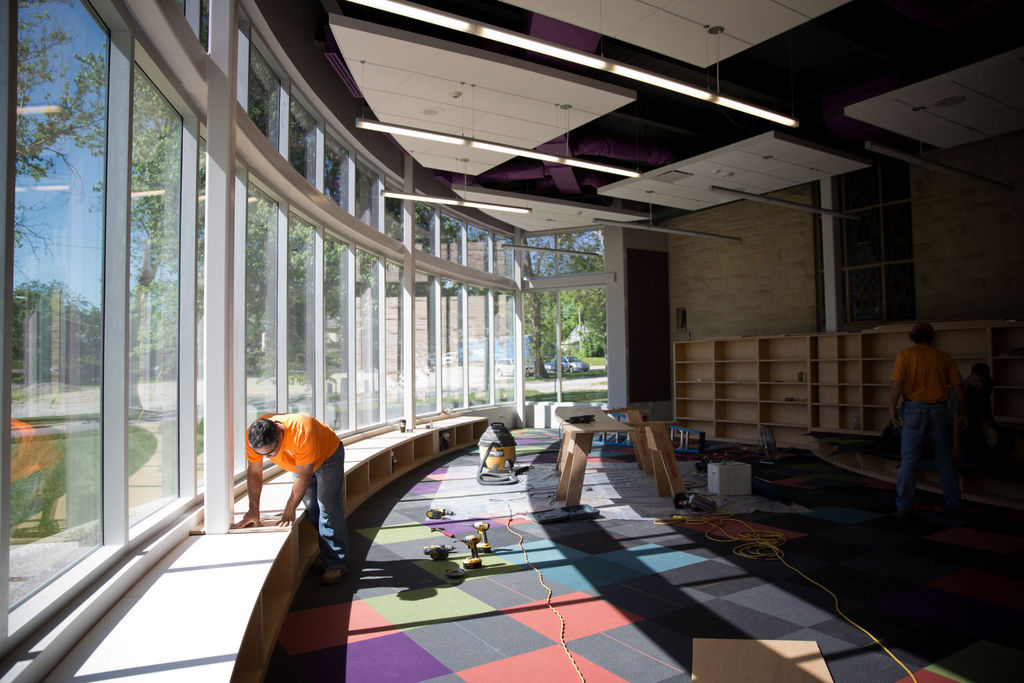Mandela would be proud

POSTED: THURSDAY, JUNE 18, 2015 1:00 AM
By Julie Anderson / World-Herald staff writer
The Lozier Foundation is wrapping up renovations, training teachers and setting up offices and classrooms in preparation for the first day of school at Nelson Mandela Elementary in early August.
The foundation announced plans a year ago to convert the former Blessed Sacrament Church and School in north Omaha into a new, private school with free tuition.
The building now features a media center addition, with a curved-glass front along North 30th Street, and a new entrance with offices, a cafeteria and commons area in the rear, off Curtis Avenue.
The old also blends with the new on the inside. The additions wrap around the building’s limestone and yellow-brick walls. Doors pass through the old carved stone archways. An original slate floor leads into the new media center, where workers last week were finishing installation of carpet tiles in the school’s new palette: gray, green, blue and purple, plus a pop of orange.
The former church sanctuary, now a gym, sports a new rubberized, wood-look floor and a colorful mural with the school’s new, sun-like logo, painted by a local artist. But the patterned ceiling tiles, wood-paneled walls and stained-glass windows of the old church remain in place, the windows protected from stray basketballs by tempered glass panels.
“It’s the prettiest gym in the city,” said Susan Toohey, the foundation’s director of educational initiatives.
Other new pieces also are falling into place. Last week, an instructor from Spalding Education International in Phoenix trained teachers in Spalding’s phonics-focused “The Writing Road to Reading,” which the school will use for reading and language arts. Teachers from several other area schools also participated, part of a collaboration among the school, the Omaha school district and the Phoenix Academy.
The school’s staff of 10 is in place and its student roster nearly set. The school will start with two sections each of kindergarten and first grade, with 25 students to a classroom, and will add a grade a year until it reaches fifth grade.
Last week, only a few first-grade slots remained, and there was a waiting list for kindergarten. Officials plan to welcome students and their families Monday at an Acceptance Day dinner at the school.
The foundation also has acquired a new partner in funding the school in the William and Ruth Scott Family Foundation. Ruth and Bill Scott contributed toward construction costs, and their foundation will help fund operations. The school otherwise is funded by the Lozier Foundation.
Dianne Seeman Lozier became a believer in the Spalding method some 20 years ago. She sits on the board of the Phoenix Academy, which uses “The Writing Road to Reading.” The Lozier Foundation also has helped fund the program at some Omaha Public Schools buildings.
John Scott said his mother is a former elementary school teacher. The family foundation strongly supports teaching phonics and believes in the role of phonics in helping children learn to read and write.
“Partnering with Lozier on this project is a great opportunity to build on that commitment,” he said.
Mandela Elementary also will offer the rigorous Singapore Math curriculum, which focuses on a deeper understanding of concepts and less on memorization.
The foundation’s aim is to put the reading and math programs in place throughout the school and demonstrate whether they’re effective in closing achievement gaps. Officials plan to share their results publicly in hopes of seeing them replicated in other schools.
“We wanted to take all the great research that’s out there and put it in one place,” said Toohey, who also serves as Mandela’s head of school.
Spalding trainers will visit three times during the year, and classrooms all are equipped with cameras so staff can videotape and upload lessons. Experts at Spalding and Singapore Math can view them and provide feedback.
The school received about 100 applications. Officials initially planned to prioritize students whose families qualified for free or reduced-price lunch and lived within a 1.5-mile radius of the school. They eventually added other criteria and assigned points.
Toohey said 93 percent of students admitted come from families that qualify for free or reduced-price meals, and 85 percent from single-parent homes.
No students were excluded based on ability, she said. The school administered the OPS kindergarten and first-grade assessment, but only to provide information for teachers. Incoming students have a wide range of abilities. The goal, Toohey said, is to have every student at grade level by third grade, a critical point in their development.
The school will have a paraprofessional in each kindergarten class, and the first-grade classes will share one. It also will have a speech therapist, an occupational therapist and a family liaison contracted through the Thrive Center, a nonprofit organization that helps youths and adults with job training and leadership skills. Center staff will come to the school to provide social skills training and be available to provide counseling for students or families if needed.
Toohey said she is budgeting per-pupil operating costs at close to $12,000 a year. That’s similar to the statewide average for 2013-14, the most recent available, based on average daily attendance. Officials have declined to specify the cost of renovating the building.
Other partnerships will help round out the school’s offerings. Nursing students from the College of St. Mary will come in two days a week to do clinical practice and teach health lessons. A University of Nebraska at Omaha public health student this summer is writing the school’s health manual and curriculum.
A Creighton University graduate student will look at assessment data and parent interviews to determine where students stand academically and help the school meet the needs of students and parents.
“We’re trying to be open to a lot of different universities,” she said. “They can build knowledge; we can learn more.”
A local soccer coach plans to start a soccer clinic and teach kids the game. Workers were pouring footings last week for soccer fields. Work on the field and on the playground has been slowed this spring by rain.
In addition to mechanical updates, classrooms also have gotten fresh coats of paint in the school’s color scheme.
“When I surveyed kids about what they want in their school,” Toohey said, “they said, ‘Bright and fun,” so I’m hoping they’ll find it that way.”
Students will wear uniforms — purple polo shirts with the school’s logo and khaki bottoms. Uniforms are the only items parents are required to buy. All students will receive free lunch. Parents, however, sign contracts to contribute volunteer time, such as reading to students during the day if they’re free or taking bulletin board letters home to cut out if they’re not.
Mandela was chosen as the school’s name in a tribute to late South African President Nelson Mandela’s advocacy for education and its power to spark change and because he modeled resilience.
The school’s pledge uses one of his quotations, “Education is the most powerful weapon which you can use to change the world.” To focus on the school’s values, the pledge adds: “I will change the world with my hope, strength, service, unity, peace and wisdom.”
The school has gone through the Nebraska Department of Education to become an approved private school. All teachers are certified. After a year, officials will take the next step and seek accreditation.
While they’re focused for now on getting the school up and running, Toohey said foundation officials will put together a strategic plan after the doors open, laying out possible future endeavors. Dreams include space for early childhood and after-school programs.
Other hallmarks of the school include:
» An extended day, from 8 a.m. to 4 p.m., with child care and breakfast available beginning at 6:30 a.m. After school, students will have the option of going home or going to Girls Inc., the Boys & Girls Club or Solomon Girls Club, all of which will transport students to their sites.
» An extended calendar that’s about seven weeks longer than OPS. School starts Aug. 5.
» Violin instruction for all students, using the Omaha Conservatory of Music’s Violin Sprouts curriculum.
» Recess or breaks every 90 minutes.
Contact the writer: 402-444-1223, julie.anderson@owh.com




